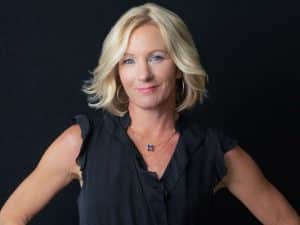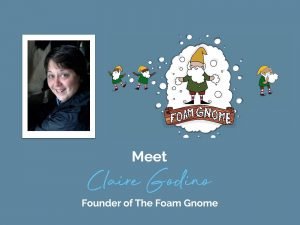Have you ever looked at a product and thought, “There has to be a better way”? That’s exactly what Susie Hewson, founder of Natracare—the world’s first organic, plastic-free period care brand, did back in the ’80s. She saw the harmful chemicals and plastic waste in period products and decided to do something about it.
When Susie started Natracare in 1989, people weren’t talking about what went into period products. But she couldn’t ignore what she was seeing. Instead of just worrying, she took action. For over 30 years now, she’s been creating products that are better for our bodies and the planet. Her pads and tampons use organic cotton and materials that break down naturally. Plus, they’re free from all those scary ingredients like chlorine and synthetic fragrances that many of us don’t want near our bodies.
Being a woman in business isn’t always easy, and Susie faced countless challenges along the way. The big corporations weren’t exactly rolling out the welcome mat for her revolutionary ideas. But she persisted, and her determination changed an entire industry.
Check out our interview with Susie below.
Susie Hewson of Natracare
What motivated you to create Natracare in 1989, when sustainable period products were virtually non-existent?
Susie Hewson: Amongst other areas, I studied textiles and had working knowledge of how synthetics were manufactured and the toxic chemicals used in that process. Being an active environmentalist, I also knew that the impact of these on water and soil systems, including the carcinogenic by-products of dioxin and furans, was accumulative and everlasting on nature and human health.
Conventional, genetically engineered cotton was also the most heavily pesticide and herbicide-sprayed crop on the planet. These were the raw materials used for period products. Of course, this made me angry – and so Natracare came to the rescue.
How did your background and personal experiences shape your understanding of women’s health and environmental sustainability?
Susie Hewson: I have been a lifelong environmentalist and women’s activist. I had campaigned on issues related to significant need for interventions in man-made ecological damage and animal welfare. Not sure that empathy is something that you learn rather than perhaps being born with, but years of standing up to corporate overreach and concern for health and nature, gave me the courage I needed to step into the period care arena alone.
As a pioneering female entrepreneur, what challenges did you face when introducing an entirely new concept in the period care industry?
Susie Hewson: Challenges come in many guises. There were the skills and financial gaps I had to overcome extremely rapidly since I relied entirely on my own library research and outreach to specific researchers within the field of period care health and safety- remember that the internet had not been invented as yet – so it was all library and institution-based knowledge building.
I also needed to learn how to deal with resistance, confrontation, and harassment. This all in the background whilst designing specifications and sourcing European contract manufacturers so I had close contact for quality controls and validated labour laws.
Ultimately, the challenge was to reach a point where Natracare was respected as a trustworthy, quality, clean, and affordable option to whatever else was concreted to retailer shelves from 1989 onwards!
How did you overcome skepticism and convince consumers to choose organic, plastic-free period products?
Susie Hewson: Scepticism was never the issue. More challenging was undoing years of consumers’ blindsidedness by the lack of full transparency around what tampons and pads were actually made from and the damaging chemicals and materials used in their supply chains.
In the mid-90s, Organic (food) was in its infancy as a mainstream category. Despite centuries of our farmers growing food without pesticides and synthetic fertilisers, the cheap and preferably synthetic was already unchallenged on retail shelves, and period care was no exception. Rayon, polyester, and plastics abound. GMO and chemically laden, conventionally grown cotton was also on the go-to list for tampons and pads – until Natracare came along. It took continued campaigning and education – helped along with the mistrust which permeated the category due to the impact of Toxic Shock Syndrome.
I understood the difficulties of getting the ecological message across to consumers who are battered every day by the noise of sleek aspirational lifestyle advertising. I believe that within all of us, there is a basic urge to protect our environment and, in so doing, our health ourselves and our families. I think that my years of campaigning for change, as well as Natracare being able to consistently show just how clean and honest we are in the design of our products, we have been given a platform to assist in changing minds and environmental outcomes.
Can you elaborate on the moment you learned about dioxin pollution and its impact on women’s health?
Susie Hewson: I had been well aware through contact with environmental campaigning to stop dioxin being dumped at sea. Then, in 1989, I saw a World in Action investigative programme about using chlorine gas and chlorine dioxide in the pulping and bleaching industries used to produce paper and absorbent products.
This focused on how nature, water sources, soils, and air were being contaminated by dioxin and furans as pollutants from the bleaching of pulp products. Toilet paper, coffee filters, diapers, period pads and liners, tampons, incontinence pads, products, all in the spectrum of investigation.
So I knew of the carcinogenic impact of the chlorine industry already, but in combination with the lack of concern and dismissiveness of brands for that impact in their consumer products, especially women’s health given the thousands of exposures experienced throughout menstruation – Maybe visualise it was a moment of discovery that I had to try to make a difference.
What advice would you give to other women entrepreneurs looking to disrupt traditional industries with sustainable solutions?
Susie Hewson: The term Disruptor has been used a lot in recent years, but from where I came from, analysis, classification, and creative solutions to problems was my profession. Everything about the status quo of the design and ingredients for pads and tampons had multiple issues. My influence as a disruptor allowed me to identify how design for positive change can lead to ecological and health improvements in a product category.
My advice would be to make sure you are fully informed and truly motivated. Be prepared to be flexible, especially if you rely on your own funding. I imagine it is easier to spend money earned by others, but keeping a grasp on the economics of the business is key to making sure you get to deliver on the objectives. Keep a perspective!
What personal qualities or strategies helped you persist in building Natracare during its early years?
Susie Hewson: Determination and a commitment to deliver on my objectives. I did not set out to build a business. I started my one-person campaign and stuck to the principles of environmentalism and human rights. I am an empathetic person and have a strong sense of justice.
Getting the best outcome meant delivering Natracare as the brand that never sourced raw materials produced using any type of chlorine bleach – on supporting organic agriculture and upholding the principles of a circular economy. All of the accreditations and validations Natracare holds today prove my strategy was both admirable and achievable.
What emerging trends in sustainable menstrual health excite you most in 2025?
Susie Hewson: I do not do “Trends” because the notion speaks of being transient rather than impactful! I prefer to see commitment from regulators to enforce full disclosure in labelling and better control of runaway greenwashing.
How do you see Natracare contributing to the global conversation about environmental sustainability and women’s health?
Susie Hewson: For many years, I have contributed to the Global Organic Textiles Standard (Annex 6 is my baby) and worked with other women’s and environmental pressure groups to drive change through regulation.
You may find me in the dark corners of such groups pressing attention to the raging fire alarm that our planet is ringing out loud and clear.
What has been the most rewarding aspect of your entrepreneurial journey?
Susie Hewson: The Whole journey has been a personal challenge because I am a graduate of art school and the educational establishment who rose to the environmental and animal welfare challenges of my time. Others call you an entrepreneur, I am just a woman who tried to do my bit!
If you could give your younger self one piece of advice about career and personal development, what would it be?
Susie Hewson: Keep moving forward on your chosen path, keeping continuous learning as a partner. Always be prepared to be adaptable as that is where the fun is. as your teacher
Lastly, is there a specific mantra, quote, or affirmation that you hold close to your heart
Susie Hewson: I am at the front line of all the surviving that my ancestors had to achieve in order for me to be here at this moment in time – don’t screw it up!
Emily Sprinkle, also known as Emma Loggins, is a designer, marketer, blogger, and speaker. She is the Editor-In-Chief for Women's Business Daily where she pulls from her experience as the CEO and Director of Strategy for Excite Creative Studios, where she specializes in web development, UI/UX design, social media marketing, and overall strategy for her clients.
Emily has also written for CNN, Autotrader, The Guardian, and is also the Editor-In-Chief for the geek lifestyle site FanBolt.com
- Emma Loggins Sprinklehttps://www.womensbusinessdaily.com/author/emma-loggins/
- Emma Loggins Sprinklehttps://www.womensbusinessdaily.com/author/emma-loggins/
- Emma Loggins Sprinklehttps://www.womensbusinessdaily.com/author/emma-loggins/
- Emma Loggins Sprinklehttps://www.womensbusinessdaily.com/author/emma-loggins/







